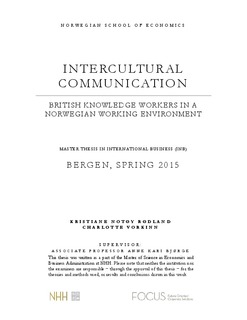Intercultural communication : British knowledge workers in a Norwegian working environment
Master thesis
Permanent lenke
http://hdl.handle.net/11250/300234Utgivelsesdato
2015Metadata
Vis full innførselSamlinger
- Master Thesis [4372]
Sammendrag
One of Norway’s main industries is oil and gas, which has an international character. In
addition, within this sector there is a greater demand for knowledge workers as opposed to
traditional workers. To date, there is a lack of research and literature directly comparing
Norway to Britain with respect to intercultural communication. Therefore, we wish to map
potential barriers regarding culture and communication in order to fill this gap. Thus, the
following research question was proposed:
What are the main cultural and communication challenges perceived by British knowledge
workers with regard to the Norwegian working environment?
The research question was answered through conducting 16 semi-structured in-depth
interviews with British knowledge workers in eight different companies. The Norwegian
working environment is assessed through a British perspective. As this approach is of a
qualitative nature without hypotheses or a probability sample, we are not able to draw
statistical conclusions or generalize our findings. However, we aim to encourage further
research within various fields as a result of our interpretation of our findings.
One of our most significant findings could be that the Law of Jante is underestimated with
regard to the GLOBE cultural dimensions. The degree to which the “law” is rooted in
Norwegian culture may not necessarily be revolutionary, but the scope of its effect on office
culture in a multicultural context is of interest. Aspects of the Law of Jante could affect a
Norwegian’s desire for feedback, conflict aversion, how ideas are shared, and who should take
responsibility. This might influence the manner in which British and Norwegians
communicate in the working environment. Another finding concerns the importance of the
role of English as a Lingua Franca and the average English proficiency of Norwegians, as these
aspects may pose challenges for a Briton attempting to learn Norwegian.
